 For many years, Dutch Flower Group (DFG) has been active in Africa and especially in Kenya, with respect to sourcing African products, like roses and carnations, as well as other varieties of cut flowers and foliage.
For many years, Dutch Flower Group (DFG) has been active in Africa and especially in Kenya, with respect to sourcing African products, like roses and carnations, as well as other varieties of cut flowers and foliage.
In the past, the activities of the DFG marketing and trading companies, based in Europe, were represented by two well-known local sourcing companies: Flower Sourcing Africa (FSA) and PROGRESS.
FSA was born out of the former DFG Kenya sourcing team. PROGRESS was the Mavuno Group, Professional Grower Export Support Services organisation, which after the DFG/Mavuno strategic alliance in May 2011, migrated to DFG. These two organisations for the last few years have been operating autonomously of each other, both sourcing from and supporting growers on behalf of Dutch Flower Group companies.
Due to the ever-changing market environment the way of working of Flower Sourcing Africa (FSA) and PROGRESS has become more and more comparable over the last few years. Both organisations are active on behalf of European multiple retail customers (i.e supermarkets) as well as floral wholesalers of Dutch Flower Group companies in The Netherlands and UK. These marketing companies deal with the leading parties in the consumer sales of cutflowers, bouquets and plants and work on a long-term basis together.

 Briefly discuss Harry (background-personal and as a grower to current position General Manager Sunland Flowers)
Briefly discuss Harry (background-personal and as a grower to current position General Manager Sunland Flowers)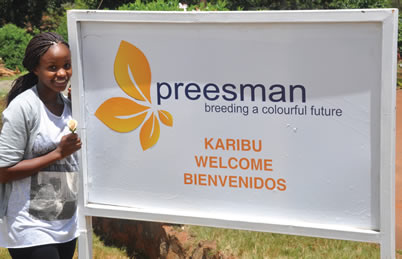 When I first visited Preesman’s new show case at Thika, it was on invitation of Jelle Posthumus, the commercial manager, Preesman. I met a team honoured to satisfy the curiosity of their customers who kept on tripling every minute courting for their attention. By count I could not tell the number of times they walked in to the new show case with a different customer then back to the reception area for either continual discussion with the same client or for a fresh discussion with a new client. On a close follow up, I realized that inside the show case was more technical and less commercial whereas in the reception was more commercial and less technical. These men had a wide knowledge of the two worlds of rose breeding. In between the customers, I stole some few minutes and managed to get a few minutes of interview with several of them.
When I first visited Preesman’s new show case at Thika, it was on invitation of Jelle Posthumus, the commercial manager, Preesman. I met a team honoured to satisfy the curiosity of their customers who kept on tripling every minute courting for their attention. By count I could not tell the number of times they walked in to the new show case with a different customer then back to the reception area for either continual discussion with the same client or for a fresh discussion with a new client. On a close follow up, I realized that inside the show case was more technical and less commercial whereas in the reception was more commercial and less technical. These men had a wide knowledge of the two worlds of rose breeding. In between the customers, I stole some few minutes and managed to get a few minutes of interview with several of them. For many years, Dutch Flower Group (DFG) has been active in Africa and especially in Kenya, with respect to sourcing African products, like roses and carnations, as well as other varieties of cut flowers and foliage.
For many years, Dutch Flower Group (DFG) has been active in Africa and especially in Kenya, with respect to sourcing African products, like roses and carnations, as well as other varieties of cut flowers and foliage.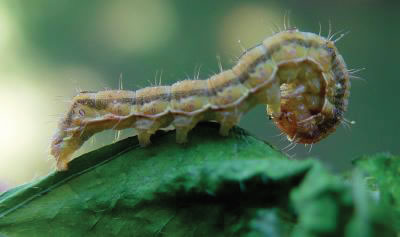 Caterpillars are seasonal pests to the flowers but when in season result in major losses to the flower industry as one caterpillar can cause damage to more than one flower. In flowers there are different kinds of caterpillar species which include helicoverpa armigera and spodopteraexigua and thus it’s important to know the exact pest that one has in their crop and out of these two, the helicoverpa species is the notorious and listed as a notifiable pest in the European market.
Caterpillars are seasonal pests to the flowers but when in season result in major losses to the flower industry as one caterpillar can cause damage to more than one flower. In flowers there are different kinds of caterpillar species which include helicoverpa armigera and spodopteraexigua and thus it’s important to know the exact pest that one has in their crop and out of these two, the helicoverpa species is the notorious and listed as a notifiable pest in the European market.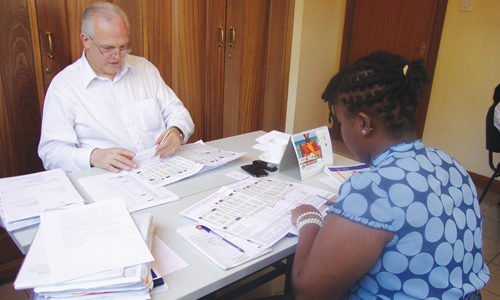 The International Flower Trade Expo (IFTEX) now enters its third year in Nairobi, Kenya, with high expectations on both quality and quantity from the organizers, exhibitors and visitors. The show, which debuted in March 2012, is quickly developing a magnetic pull for the flower industry fraternity not only in Africa but the world over.
The International Flower Trade Expo (IFTEX) now enters its third year in Nairobi, Kenya, with high expectations on both quality and quantity from the organizers, exhibitors and visitors. The show, which debuted in March 2012, is quickly developing a magnetic pull for the flower industry fraternity not only in Africa but the world over.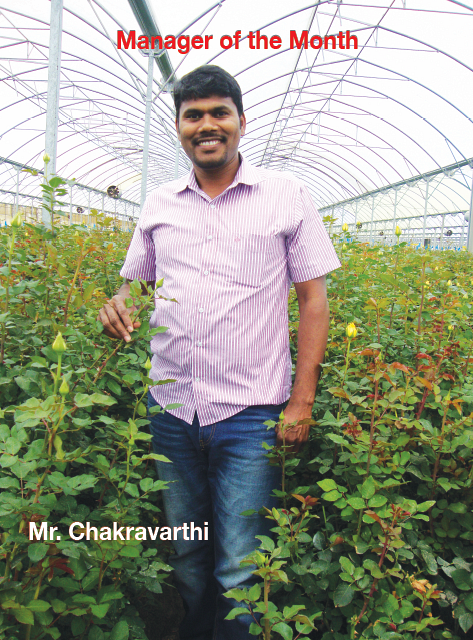 Chakravarthi : The Grower.
Chakravarthi : The Grower. Naivasha flower farms that subscribe to Fairtrade (FLO) standards and are Fairtrade certified have completely changed the image of the District hospital maternity wing. Initially it was an image of 20 women in labour crowded in one central room quietly moaning and swaying until it is their time to go to one large delivery room to deliver in a cot-directly next to another mother giving birth. To date, it is one of the nicest African facilities handling over 500 deliveries monthly. Women and new borns can now enjoy privacy, respect and safety they deserve during their birth experiences.
Naivasha flower farms that subscribe to Fairtrade (FLO) standards and are Fairtrade certified have completely changed the image of the District hospital maternity wing. Initially it was an image of 20 women in labour crowded in one central room quietly moaning and swaying until it is their time to go to one large delivery room to deliver in a cot-directly next to another mother giving birth. To date, it is one of the nicest African facilities handling over 500 deliveries monthly. Women and new borns can now enjoy privacy, respect and safety they deserve during their birth experiences.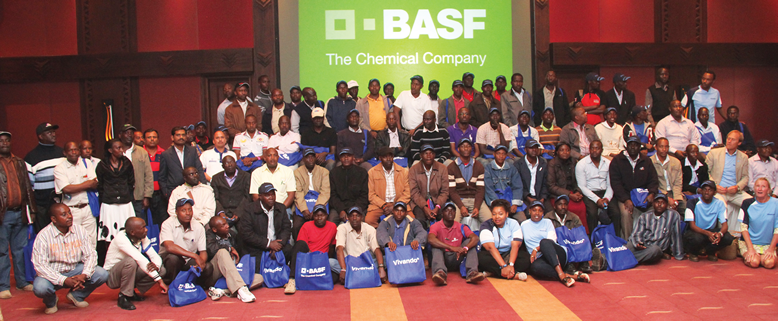 Viva… Viva… Vivando, Viva… Viva… Vivando, filled the air as one of the biggest chemical companies in the world, BASF, launched a creative mode of action with cutting edge technology for the control of powdery mildew in ornamentals. Time almost audio recorded voice of Mr. Patrick Ngugi, Country Manager-Kenya, Crop Protection and public health asked, “Are you afraid of powdery mildew? Are you concerned by the ever increasing threat of resistance build up by fungicides? Are you concerned of scotching flowers and leaving residue? Are you concerned of WHO class of your choice product, Can you achieve your goals in farming without IPM? Do you use wetter from time to time?” Each of the questionreceived a resourcing ‘Yes’ from the over 150 growers in attendance. Today I stand in front you to offer your solution, Vivando.
Viva… Viva… Vivando, Viva… Viva… Vivando, filled the air as one of the biggest chemical companies in the world, BASF, launched a creative mode of action with cutting edge technology for the control of powdery mildew in ornamentals. Time almost audio recorded voice of Mr. Patrick Ngugi, Country Manager-Kenya, Crop Protection and public health asked, “Are you afraid of powdery mildew? Are you concerned by the ever increasing threat of resistance build up by fungicides? Are you concerned of scotching flowers and leaving residue? Are you concerned of WHO class of your choice product, Can you achieve your goals in farming without IPM? Do you use wetter from time to time?” Each of the questionreceived a resourcing ‘Yes’ from the over 150 growers in attendance. Today I stand in front you to offer your solution, Vivando.